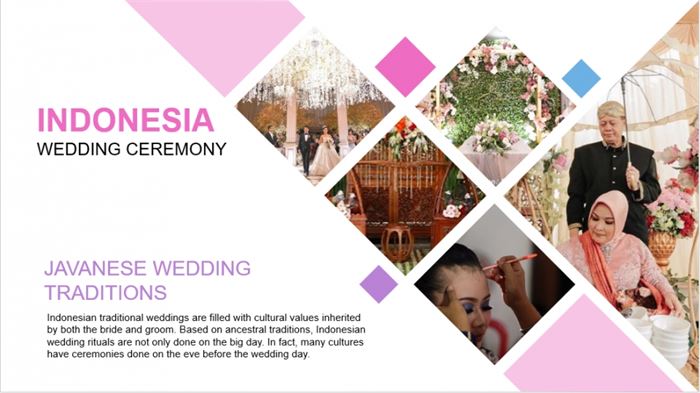 Indonesian traditional weddings are filled with cultural values inherited by both the bride and groom. Based on ancestral traditions, Indonesian wedding rituals are not only done on the big day. In fact, many cultures have ceremonies done on the eve before the wedding day.
Indonesian traditional weddings are filled with cultural values inherited by both the bride and groom. Based on ancestral traditions, Indonesian wedding rituals are not only done on the big day. In fact, many cultures have ceremonies done on the eve before the wedding day.
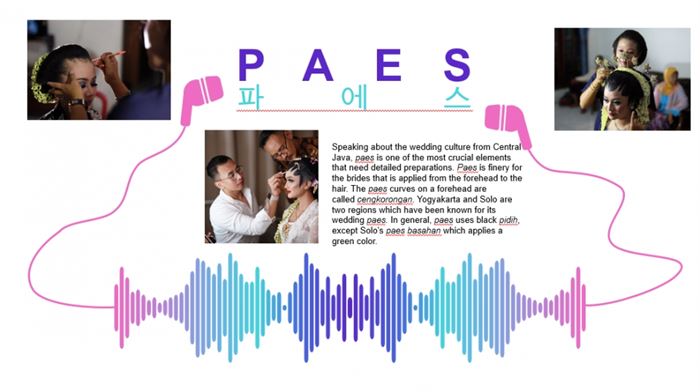 Speaking about the wedding culture from Central Java, paes is one of the most crucial elements that need detailed preparations. Paes is finery for the brides that is applied from the forehead to the hair. The paes curves on a forehead are called cengkorongan. Yogyakarta and Solo are two regions which have been known for its wedding paes. In general, paes uses black pidih, except Solo's paes basahan which applies a green color.
Speaking about the wedding culture from Central Java, paes is one of the most crucial elements that need detailed preparations. Paes is finery for the brides that is applied from the forehead to the hair. The paes curves on a forehead are called cengkorongan. Yogyakarta and Solo are two regions which have been known for its wedding paes. In general, paes uses black pidih, except Solo's paes basahan which applies a green color.
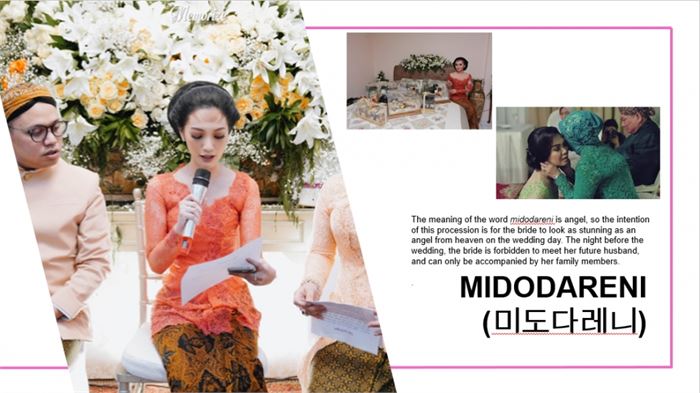 The meaning of the word midodareni is angel, so the intention of this procession is for the bride to look as stunning as an angel from heaven on the wedding day. The night before the wedding, the bride is forbidden to meet her future husband, and can only be accompanied by her family members.
The meaning of the word midodareni is angel, so the intention of this procession is for the bride to look as stunning as an angel from heaven on the wedding day. The night before the wedding, the bride is forbidden to meet her future husband, and can only be accompanied by her family members.
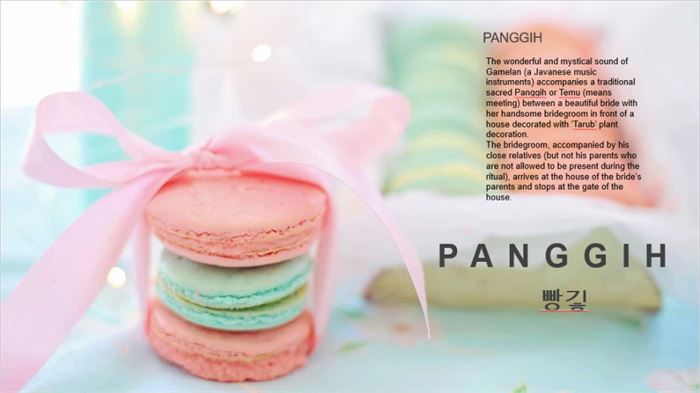 The wonderful and mystical sound of Gamelan (a Javanese music instruments) accompanies a traditional sacred Panggih or Temu (means meeting) between a beautiful bride with her handsome bridegroom in front of a house decorated with ’Tarub’ plant decoration.
The wonderful and mystical sound of Gamelan (a Javanese music instruments) accompanies a traditional sacred Panggih or Temu (means meeting) between a beautiful bride with her handsome bridegroom in front of a house decorated with ’Tarub’ plant decoration.
The bridegroom, accompanied by his close relatives (but not his parents who are not allowed to be present during the ritual), arrives at the house of the bride’s parents and stops at the gate of the house.
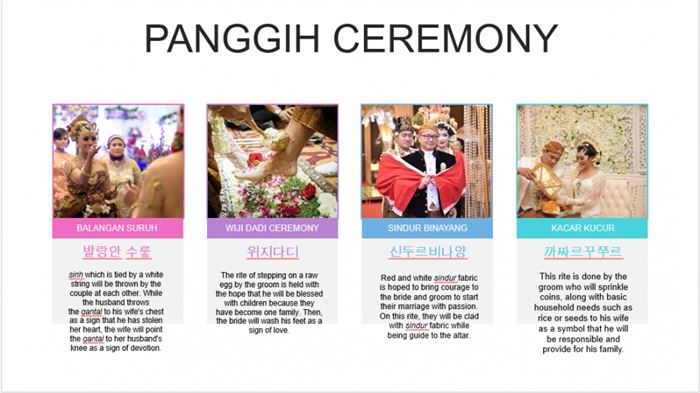
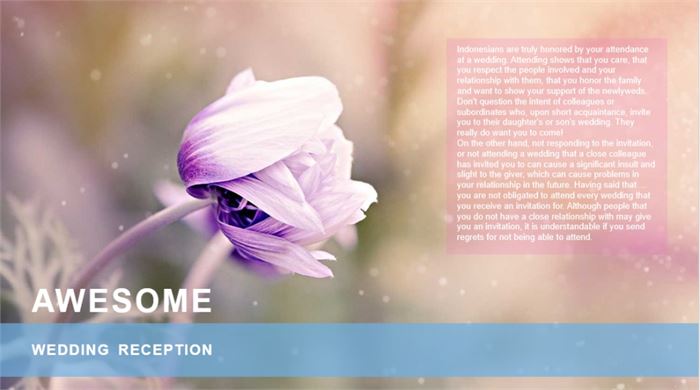 Indonesians are truly honored by your attenIndonesians are truly honored by your attendance at a wedding. Attending shows that you care, that you respect the people involved and your relationship with them, that you honor the family and want to show your support of the newlyweds. Don't question the intent of colleagues or subordinates who, upon short acquaintance, invite you to their daughter's or son's wedding. They really do want you to come!
Indonesians are truly honored by your attenIndonesians are truly honored by your attendance at a wedding. Attending shows that you care, that you respect the people involved and your relationship with them, that you honor the family and want to show your support of the newlyweds. Don't question the intent of colleagues or subordinates who, upon short acquaintance, invite you to their daughter's or son's wedding. They really do want you to come!
On the other hand, not responding to the invitation, or not attending a wedding that a close colleague has invited you to can cause a significant insult and slight to the giver, which can cause problems in your relationship in the future. Having said that ... you are not obligated to attend every wedding that you receive an invitation for. Although people that you do not have a close relationship with may give you an invitation, it is understandable if you send regrets for not being able to attend.
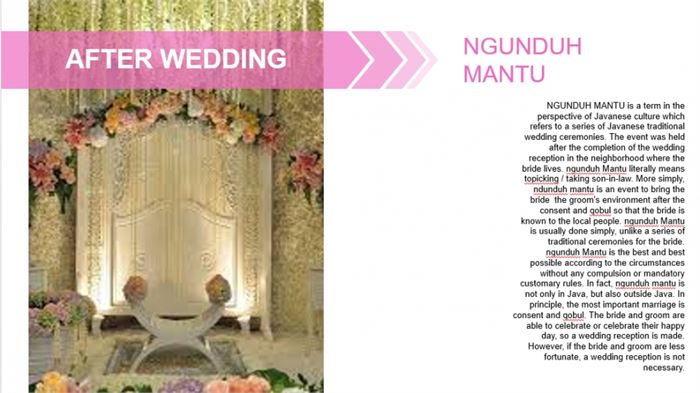 NGUNDUH MANTU is a term in the perspective of Javanese culture which refers to a series of Javanese traditional wedding ceremonies. The event was held after the completion of the wedding reception in the neighborhood where the bride lives. ngunduh Mantu literally means topicking / taking son-in-law. More simply, ndunduh mantu is an event to bring the bride the groom's environment after the consent and qobul so that the bride is known to the local people. ngunduh Mantu is usually done simply, unlike a series of traditional ceremonies for the bride. ngunduh Mantu is the best and best possible according to the circumstances without any compulsion or mandatory customary rules. In fact, ngunduh mantu is not only in Java, but also outside Java. In principle, the most important marriage is consent and qobul. The bride and groom are able to celebrate or celebrate their happy day, so a wedding reception is made. However, if the bride and groom are less fortunate, a wedding reception is not necessary.
NGUNDUH MANTU is a term in the perspective of Javanese culture which refers to a series of Javanese traditional wedding ceremonies. The event was held after the completion of the wedding reception in the neighborhood where the bride lives. ngunduh Mantu literally means topicking / taking son-in-law. More simply, ndunduh mantu is an event to bring the bride the groom's environment after the consent and qobul so that the bride is known to the local people. ngunduh Mantu is usually done simply, unlike a series of traditional ceremonies for the bride. ngunduh Mantu is the best and best possible according to the circumstances without any compulsion or mandatory customary rules. In fact, ngunduh mantu is not only in Java, but also outside Java. In principle, the most important marriage is consent and qobul. The bride and groom are able to celebrate or celebrate their happy day, so a wedding reception is made. However, if the bride and groom are less fortunate, a wedding reception is not necessary.

<데위 푸르위타 사리·유학생(글로벌한국학 전공)/인도네시아>